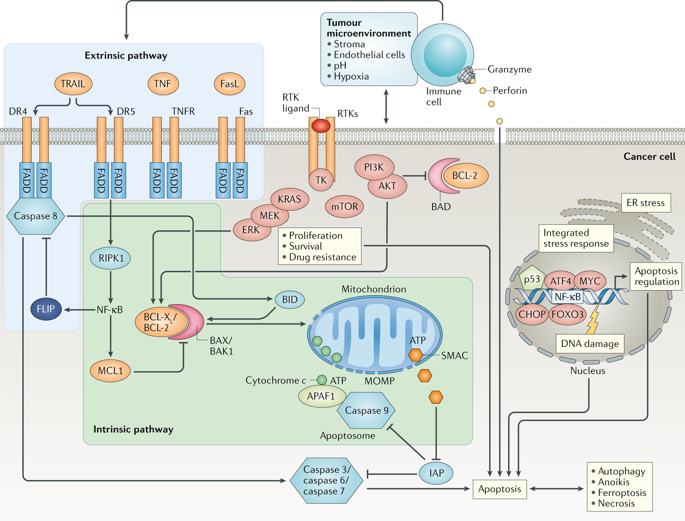Nature Reviews Clinical Oncology ( IF 78.8 ) Pub Date : 2020-03-23 , DOI: 10.1038/s41571-020-0341-y Benedito A Carneiro 1 , Wafik S El-Deiry 1

|
For over three decades, a mainstay and goal of clinical oncology has been the development of therapies promoting the effective elimination of cancer cells by apoptosis. This programmed cell death process is mediated by several signalling pathways (referred to as intrinsic and extrinsic) triggered by multiple factors, including cellular stress, DNA damage and immune surveillance. The interaction of apoptosis pathways with other signalling mechanisms can also affect cell death. The clinical translation of effective pro-apoptotic agents involves drug discovery studies (addressing the bioavailability, stability, tumour penetration, toxicity profile in non-malignant tissues, drug interactions and off-target effects) as well as an understanding of tumour biology (including heterogeneity and evolution of resistant clones). While tumour cell death can result in response to therapy, the selection, growth and dissemination of resistant cells can ultimately be fatal. In this Review, we present the main apoptosis pathways and other signalling pathways that interact with them, and discuss actionable molecular targets, therapeutic agents in clinical translation and known mechanisms of resistance to these agents.
中文翻译:

癌症治疗中以细胞凋亡为目标。
三十多年来,临床肿瘤学的支柱和目标一直是开发促进通过细胞凋亡有效消除癌细胞的疗法。这种程序性细胞死亡过程是由多种因素触发的多种信号通路(称为内在和外在)介导的,包括细胞应激、DNA 损伤和免疫监视。细胞凋亡途径与其他信号机制的相互作用也会影响细胞死亡。有效的促凋亡药物的临床转化涉及药物发现研究(解决生物利用度、稳定性、肿瘤渗透性、非恶性组织中的毒性特征、药物相互作用和脱靶效应)以及对肿瘤生物学的理解(包括异质性)和抗性克隆的进化)。虽然肿瘤细胞死亡可以导致对治疗的反应,但耐药细胞的选择、生长和传播最终可能是致命的。在这篇综述中,我们介绍了主要的细胞凋亡途径和与其相互作用的其他信号传导途径,并讨论了可操作的分子靶标、临床转化中的治疗药物以及对这些药物的已知耐药机制。



























 京公网安备 11010802027423号
京公网安备 11010802027423号